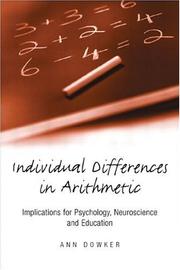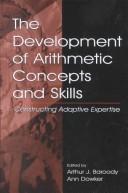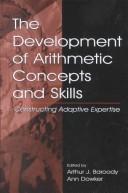| Listing 1 - 10 of 17 | << page >> |
Sort by
|

ISBN: 1841692352 Year: 2005 Publisher: Hove Psychology Press
Abstract | Keywords | Export | Availability | Bookmark
 Loading...
Loading...Choose an application
- Reference Manager
- EndNote
- RefWorks (Direct export to RefWorks)
Mathematical ability. --- Number concept. --- Aptitude pour les mathématiques --- Concept de nombre --- #PBIB:2005.4 --- 159.91 --- Psychofysiologie. Neuropsychologie. Psychomotoriek. Psychomotorische therapie --- 159.91 Psychofysiologie. Neuropsychologie. Psychomotoriek. Psychomotorische therapie --- Aptitude pour les mathématiques --- Mathematical ability --- Number concept --- Apperception --- Psychology --- Arithmetical ability --- Number ability --- Ability
Book
ISBN: 1281762369 9786611762360 0080559778 0123736293 9780123736291 9780080559773 Year: 2008 Publisher: London : Academic,
Abstract | Keywords | Export | Availability | Bookmark
 Loading...
Loading...Choose an application
- Reference Manager
- EndNote
- RefWorks (Direct export to RefWorks)
This book examines the mathematical difficulties in typical and atypical populations. It discusses the behavioural, educational and neuropsychological characteristics of people with mathematical difficulties, and educational interventions to prevent, diagnose, treat or ameliorate such difficulties. The book brings together studies from different disciplines, including developmental psychology, neuroscience and education, and includes perspectives from practicing teachers.The book is divided into three major sections. The first includes chapters about the nature and characteristics of m
Mathematical ability. --- Mathematical ability in children. --- Mathematics --- Psychological aspects. --- Math --- Science --- Ability in children --- Arithmetical ability --- Number ability --- Ability
Book
ISBN: 2889633764 Year: 2020 Publisher: Frontiers Media SA
Abstract | Keywords | Export | Availability | Bookmark
 Loading...
Loading...Choose an application
- Reference Manager
- EndNote
- RefWorks (Direct export to RefWorks)
Digital
ISBN: 9780123736291 0123736293 9780080559773 0080559778 Year: 2008 Publisher: San Diego, CA Academic Press
Abstract | Keywords | Export | Availability | Bookmark
 Loading...
Loading...Choose an application
- Reference Manager
- EndNote
- RefWorks (Direct export to RefWorks)
This book examines the mathematical difficulties in typical and atypical populations. It discusses the behavioural, educational and neuropsychological characteristics of people with mathematical difficulties, and educational interventions to prevent, diagnose, treat or ameliorate such difficulties. The book brings together studies from different disciplines, including developmental psychology, neuroscience and education, and includes perspectives from practicing teachers. The book is divided into three major sections. The first includes chapters about the nature and characteristics of mathematical difficulties in the population as a whole, in relation to both psychology and education. The second deals with mathematical difficulties in children with other problems such as specific language impairment and dyslexia. The third discusses methods of interventions aimed at preventing, treating or ameliorating mathematical difficulties, and will include discussions of assessment and diagnosis.
Book
ISBN: 9781138800335 9781138800342 Year: 2019 Publisher: Abingdon Routledge
Abstract | Keywords | Export | Availability | Bookmark
 Loading...
Loading...Choose an application
- Reference Manager
- EndNote
- RefWorks (Direct export to RefWorks)
Book
ISBN: 9780199642342 0199642346 9780191750878 9780191036002 0191036005 Year: 2015 Publisher: Oxford: Oxford university press,
Abstract | Keywords | Export | Availability | Bookmark
 Loading...
Loading...Choose an application
- Reference Manager
- EndNote
- RefWorks (Direct export to RefWorks)
This book provides a comprehensive overview of numerical cognition by bringing together writing by leading researchers in psychology, neuroscience, and education, covering work using different methodological approaches in humans and animals. During the last decade there had been an explosion of studies and new findings with theoretical and translational implications. This progress has been made thanks to technological advances enabling sophisticated human neuroimaging techniques and neurophysiological studies of monkeys, and to advances in more traditional psychological and educational research. This has resulted in an enormous advance in our understanding of the neural and cognitive mechanisms of numerical cognition. In addition, there has recently been increasing interest and concern about pupils' mathematical achievement, resulting in attempts to use research to guide mathematics instruction in schools, and to develop interventions for children with mathematical difficulties. This book aims to provide a broad and extensive review of the field of numerical cognition, bringing together work from varied areas. The book covers research on important aspects of numerical cognition, involving findings from the areas of developmental psychology, cognitive psychology, human and animal neuroscience, computational modeling, neuropsychology and rehabilitation, learning disabilities education and individual differences, cross-cultural and cross-linguistic studies, and philosophy. It also includes an overview 'navigator' chapter for each section to provide a brief up-to-date review of the current literature, and to introduce and integrate the topics of the chapters in the section.
Cognitive psychology --- Philosophical anthropology --- Physiology of nerves and sense organs --- Mathematical ability --- Cognition --- Psychological aspects --- Cognition. --- Psychological aspects. --- Number concept --- Apperception --- Psychology --- Mathematical ability - Psychological aspects

Abstract | Keywords | Export | Availability | Bookmark
 Loading...
Loading...Choose an application
- Reference Manager
- EndNote
- RefWorks (Direct export to RefWorks)
#PBIB:2003.3 --- 159.92 --- Geestelijke ontwikkeling en vermogen. Ontwikkelingspsychologie --- Arithmetic --- Experimentele psychologie --- Study and teaching (Elementary) --- denken, begripsvorming en problem solving --- Study and teaching (Elementary). --- denken, begripsvorming en problem solving. --- 159.92 Geestelijke ontwikkeling en vermogen. Ontwikkelingspsychologie --- Denken, begripsvorming en problem solving.

ISBN: 9780805831566 0805831568 Year: 2012 Publisher: Mahwah (N.J.): Erlbaum,
Abstract | Keywords | Export | Availability | Bookmark
 Loading...
Loading...Choose an application
- Reference Manager
- EndNote
- RefWorks (Direct export to RefWorks)
This volume focuses on two related questions that are central to both the psychology of mathematical thinking and learning and to the improvement of mathematics education : what is the nature of arithmetic expertise ? How can instruction best promote it ? Contributors from a variety of specialities, including cognitive, developmental, educational, and neurological psychology ; mathematics education ; and special education offer theoretical perspectives and much needed empirical evidence about these issues.As reported in this volume, both theory and research indicate that the nature of arithmetic expertise and how to best promote it are far more complex than conventional wisdom and many scholars, past and present, have suggested. The results of psychological, educational, and clinical studies using a wide range of arithmetic tasks and populations (including "normally" and atypically developing children, non-injured and brain-injured adults, and savants) all point to the same conclusion: The heart of arithmetic fluency, in general, and the flexible and creative use of strategies, in particular, is what is termed "adaptive expertise" (meaningful or conceptually based knowledge). The construction of adaptive expertise in mathematics is, for the first time, examined across various arithmetic topics and age groups.This book will be an invaluable resource for researchers and graduate students interested in mathematical cognition and learning (including mathematics educators, developmental and educational psychologists, and neuropsychologists), educators (including teachers, curriculum supervisors, and school administrators), and others interested in improving arithmetic instruction (including officials in national and local education departments, the media, and parents).
Book
Abstract | Keywords | Export | Availability | Bookmark
 Loading...
Loading...Choose an application
- Reference Manager
- EndNote
- RefWorks (Direct export to RefWorks)
For many years, an abstract, amodal semantic magnitude representation, largely independent of verbal linguistic representations, has been viewed as the core numerical or mathematical representation This assumption has been substantially challenged in recent years. Linguistic properties affect not only verbal representations of numbers, but also numerical magnitude representation, spatial magnitude representations, calculation, parity representation, place-value representation and even early number acquisition. Thus, we postulate that numerical and arithmetic processing are not fully independent of linguistic processing. This is not to say, that in patients, magnitude processing cannot function independently of linguistic processing we just suppose, these functions are connected in the functioning brain. So far, much research about linguistic influences on numerical cognition has simply demonstrated that language influences number without investigating the level at which a particular language influence operates. After an overview, we present new findings on language influences on seven language levels: - Conceptual: Conceptual properties of language - Syntactic: The grammatical structure of languages beyond the word level influences - Semantic: The semantic meaning or existence of words - Lexical: The lexical composition of words, in particular number words - Visuo-spatial-orthographic: Orthographic properties, such as the writing/reading direction of a language - Phonological: Phonological/phonetic properties of languages - Other language-related skills: Verbal working memory and other cognitive skills related to language representations We hope that this book provides a new and structured overview on the exciting influences of linguistic processing on numerical cognition at almost all levels of language processing.
Mathematical linguistics. --- Cognition. --- Linguistic influences --- number word transparency --- SNARC --- Numerical cognition --- Language --- working memory --- Inversion property --- syntax --- semantics --- Lexical Processing
Book
Abstract | Keywords | Export | Availability | Bookmark
 Loading...
Loading...Choose an application
- Reference Manager
- EndNote
- RefWorks (Direct export to RefWorks)
For many years, an abstract, amodal semantic magnitude representation, largely independent of verbal linguistic representations, has been viewed as the core numerical or mathematical representation This assumption has been substantially challenged in recent years. Linguistic properties affect not only verbal representations of numbers, but also numerical magnitude representation, spatial magnitude representations, calculation, parity representation, place-value representation and even early number acquisition. Thus, we postulate that numerical and arithmetic processing are not fully independent of linguistic processing. This is not to say, that in patients, magnitude processing cannot function independently of linguistic processing we just suppose, these functions are connected in the functioning brain. So far, much research about linguistic influences on numerical cognition has simply demonstrated that language influences number without investigating the level at which a particular language influence operates. After an overview, we present new findings on language influences on seven language levels: - Conceptual: Conceptual properties of language - Syntactic: The grammatical structure of languages beyond the word level influences - Semantic: The semantic meaning or existence of words - Lexical: The lexical composition of words, in particular number words - Visuo-spatial-orthographic: Orthographic properties, such as the writing/reading direction of a language - Phonological: Phonological/phonetic properties of languages - Other language-related skills: Verbal working memory and other cognitive skills related to language representations We hope that this book provides a new and structured overview on the exciting influences of linguistic processing on numerical cognition at almost all levels of language processing.
Mathematical linguistics. --- Cognition. --- Linguistic influences --- number word transparency --- SNARC --- Numerical cognition --- Language --- working memory --- Inversion property --- syntax --- semantics --- Lexical Processing
| Listing 1 - 10 of 17 | << page >> |
Sort by
|

 Search
Search Feedback
Feedback About UniCat
About UniCat  Help
Help News
News